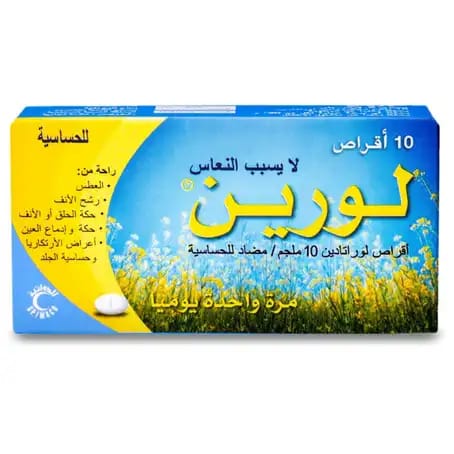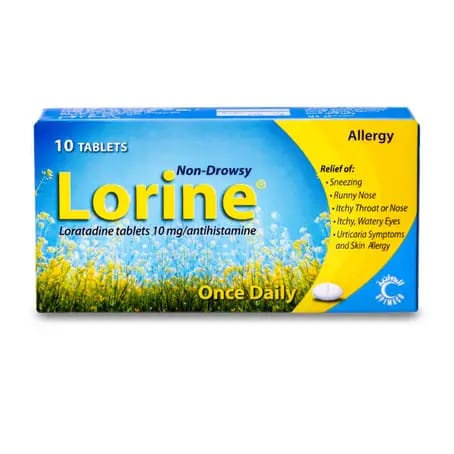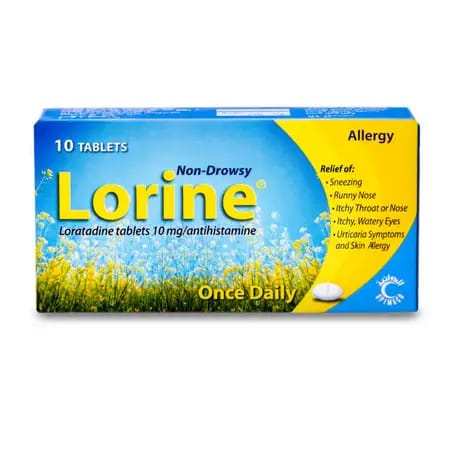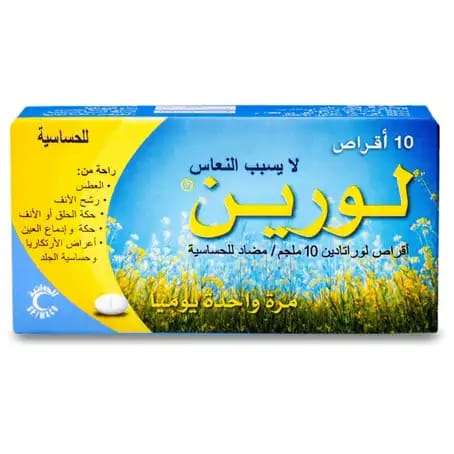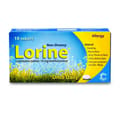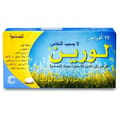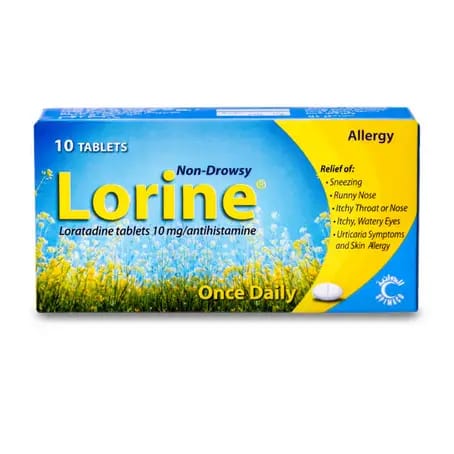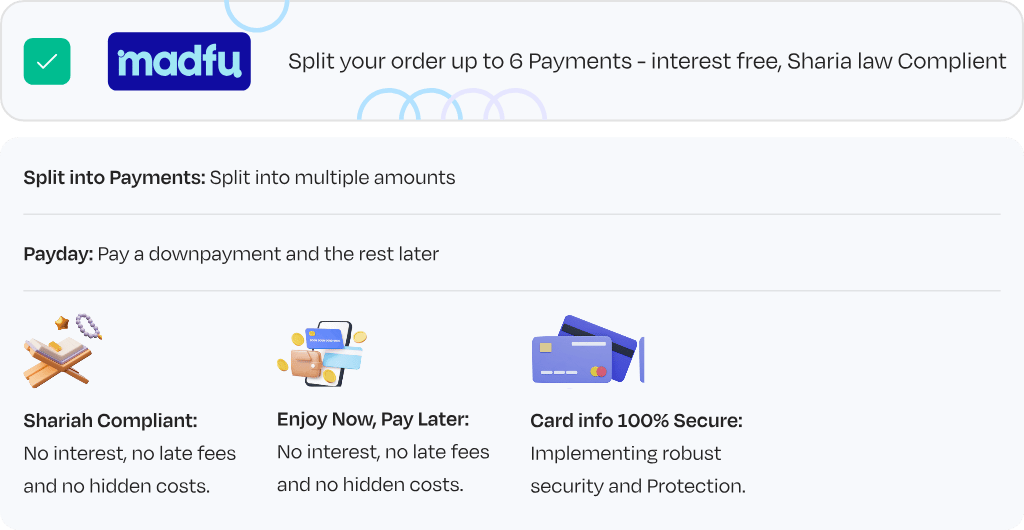What Loratadine is used for
Loratadine tablets are used to relieve symptoms associated with seasonal allergic rhinitis (hay fever) and perennial allergic rhinitis. Symptoms of these conditions can include sneezing, runny nose, nasal itching, in addition to burning, itching and watering of the eyes.
Loratadine tablets are also used to relieve symptoms of chronic idiopathic urticaria (skin rash consisting of hives and wheals).
Do not take Loratadine
If you are allergic to loratadine or any of the other ingredients of this medicine
Warnings and precautions
Talk to your doctor or pharmacist before taking loratadine if:
• you have severe liver problems
• you are due to have any skin tests for allergies. Do not take Loratadine Tablets for two days before having these tests. This is because it may affect the test results
Possible side effects
You must stop taking Loratadine tablets immediately and consult your doctor if you develop an allergic reaction to this medicine. This can consist of:
• skin rash or eruptions (including inside the mouth)
• itching
• swelling of the face/tongue/lips/hands/feet
• breathing difficulties.
The most commonly reported side effects in adults and children over 12 years are:
• drowsiness
• headache
• increased appetite
• difficulty sleeping.
The most commonly reported side effects in children aged 2 to 12 years are:
• headache
• nervousness
• tiredness.
Other medicines and Loratadine
Tell your doctor or pharmacist if you are taking:
• ketoconazole (used to treat fungal infections)
• erythromycin (an antibiotic)
• cimetidine (used in treatment of heartburn)
How to take Loratadine
Adults (including older people): 10 mg once daily (one tablet once daily)
Children over 12 years of age: 10 mg once daily (one tablet once daily)
Children aged 2 to 12 years of age:
• Body weight over 30 kg: 10 mg once daily (one tablet once daily)
• Body weight 30 kg or below: Not recommended
Children aged less than 2 years of age: Not recommended
The tablet should be swallowed whole with a drink of water. It may be taken with or without food.
How to store Loratadine
Keep this medicine out of the sight and reach of children.
• Do not use this medicine after the expiry date which is stated on the carton and foil after 'EXP'. The expiry date refers to the last day of that month.
• Store in the original package.
• Do not throw away any medicines via wastewater or household waste. Ask your pharmacist how to throw away medicines you no longer use. These measures will help protect the environment.
4674- Home
- Medications
- OTC
- Lorine 10mg 10 Tab
Lorine 10mg 10 Tab
 17.65
17.65Loyalty Program
Loyalty
For each qualifying purchase you make, you will accumulate loyalty points. These points can then be redeemed for a variety of rewards such as discounts, exclusive, offers or even free products.
For Each
100
SAR
-->
100
POINTS
TIER2
100
SPAR SPEND
=
100
POINTS
TIER3
100
SPAR SPEND
=
100
POINTS
- Details
What Loratadine is used for
Loratadine tablets are used to relieve symptoms associated with seasonal allergic rhinitis (hay fever) and perennial allergic rhinitis. Symptoms of these conditions can include sneezing, runny nose, nasal itching, in addition to burning, itching and watering of the eyes.
Loratadine tablets are also used to relieve symptoms of chronic idiopathic urticaria (skin rash consisting of hives and wheals).
Do not take Loratadine
If you are allergic to loratadine or any of the other ingredients of this medicine
Warnings and precautions
Talk to your doctor or pharmacist before taking loratadine if:
• you have severe liver problems
• you are due to have any skin tests for allergies. Do not take Loratadine Tablets for two days before having these tests. This is because it may affect the test results
Possible side effects
You must stop taking Loratadine tablets immediately and consult your doctor if you develop an allergic reaction to this medicine. This can consist of:
• skin rash or eruptions (including inside the mouth)
• itching
• swelling of the face/tongue/lips/hands/feet
• breathing difficulties.
The most commonly reported side effects in adults and children over 12 years are:
• drowsiness
• headache
• increased appetite
• difficulty sleeping.
The most commonly reported side effects in children aged 2 to 12 years are:
• headache
• nervousness
• tiredness.
Other medicines and Loratadine
Tell your doctor or pharmacist if you are taking:
• ketoconazole (used to treat fungal infections)
• erythromycin (an antibiotic)
• cimetidine (used in treatment of heartburn)
How to take Loratadine
Adults (including older people): 10 mg once daily (one tablet once daily)
Children over 12 years of age: 10 mg once daily (one tablet once daily)
Children aged 2 to 12 years of age:
• Body weight over 30 kg: 10 mg once daily (one tablet once daily)
• Body weight 30 kg or below: Not recommended
Children aged less than 2 years of age: Not recommended
The tablet should be swallowed whole with a drink of water. It may be taken with or without food.
How to store Loratadine
Keep this medicine out of the sight and reach of children.
• Do not use this medicine after the expiry date which is stated on the carton and foil after 'EXP'. The expiry date refers to the last day of that month.
• Store in the original package.
• Do not throw away any medicines via wastewater or household waste. Ask your pharmacist how to throw away medicines you no longer use. These measures will help protect the environment.
What Loratadine is used for
Loratadine tablets are used to relieve symptoms associated with seasonal allergic rhinitis (hay fever) and perennial allergic rhinitis. Symptoms of these conditions can include sneezing, runny nose, nasal itching, in addition to burning, itching and watering of the eyes.
Loratadine tablets are also used to relieve symptoms of chronic idiopathic urticaria (skin rash consisting of hives and wheals).
Do not take Loratadine
If you are allergic to loratadine or any of the other ingredients of this medicine
Warnings and precautions
Talk to your doctor or pharmacist before taking loratadine if:
• you have severe liver problems
• you are due to have any skin tests for allergies. Do not take Loratadine Tablets for two days before having these tests. This is because it may affect the test results
Possible side effects
You must stop taking Loratadine tablets immediately and consult your doctor if you develop an allergic reaction to this medicine. This can consist of:
• skin rash or eruptions (including inside the mouth)
• itching
• swelling of the face/tongue/lips/hands/feet
• breathing difficulties.
The most commonly reported side effects in adults and children over 12 years are:
• drowsiness
• headache
• increased appetite
• difficulty sleeping.
The most commonly reported side effects in children aged 2 to 12 years are:
• headache
• nervousness
• tiredness.
Other medicines and Loratadine
Tell your doctor or pharmacist if you are taking:
• ketoconazole (used to treat fungal infections)
• erythromycin (an antibiotic)
• cimetidine (used in treatment of heartburn)
How to take Loratadine
Adults (including older people): 10 mg once daily (one tablet once daily)
Children over 12 years of age: 10 mg once daily (one tablet once daily)
Children aged 2 to 12 years of age:
• Body weight over 30 kg: 10 mg once daily (one tablet once daily)
• Body weight 30 kg or below: Not recommended
Children aged less than 2 years of age: Not recommended
The tablet should be swallowed whole with a drink of water. It may be taken with or without food.
How to store Loratadine
Keep this medicine out of the sight and reach of children.
• Do not use this medicine after the expiry date which is stated on the carton and foil after 'EXP'. The expiry date refers to the last day of that month.
• Store in the original package.
• Do not throw away any medicines via wastewater or household waste. Ask your pharmacist how to throw away medicines you no longer use. These measures will help protect the environment.
What Loratadine is used for
Loratadine tablets are used to relieve symptoms associated with seasonal allergic rhinitis (hay fever) and perennial allergic rhinitis. Symptoms of these conditions can include sneezing, runny nose, nasal itching, in addition to burning, itching and watering of the eyes.
Loratadine tablets are also used to relieve symptoms of chronic idiopathic urticaria (skin rash consisting of hives and wheals).
Do not take Loratadine
If you are allergic to loratadine or any of the other ingredients of this medicine
Warnings and precautions
Talk to your doctor or pharmacist before taking loratadine if:
• you have severe liver problems
• you are due to have any skin tests for allergies. Do not take Loratadine Tablets for two days before having these tests. This is because it may affect the test results
Possible side effects
You must stop taking Loratadine tablets immediately and consult your doctor if you develop an allergic reaction to this medicine. This can consist of:
• skin rash or eruptions (including inside the mouth)
• itching
• swelling of the face/tongue/lips/hands/feet
• breathing difficulties.
The most commonly reported side effects in adults and children over 12 years are:
• drowsiness
• headache
• increased appetite
• difficulty sleeping.
The most commonly reported side effects in children aged 2 to 12 years are:
• headache
• nervousness
• tiredness.
Other medicines and Loratadine
Tell your doctor or pharmacist if you are taking:
• ketoconazole (used to treat fungal infections)
• erythromycin (an antibiotic)
• cimetidine (used in treatment of heartburn)
How to take Loratadine
Adults (including older people): 10 mg once daily (one tablet once daily)
Children over 12 years of age: 10 mg once daily (one tablet once daily)
Children aged 2 to 12 years of age:
• Body weight over 30 kg: 10 mg once daily (one tablet once daily)
• Body weight 30 kg or below: Not recommended
Children aged less than 2 years of age: Not recommended
The tablet should be swallowed whole with a drink of water. It may be taken with or without food.
How to store Loratadine
Keep this medicine out of the sight and reach of children.
• Do not use this medicine after the expiry date which is stated on the carton and foil after 'EXP'. The expiry date refers to the last day of that month.
• Store in the original package.
• Do not throw away any medicines via wastewater or household waste. Ask your pharmacist how to throw away medicines you no longer use. These measures will help protect the environment.
What Loratadine is used for
Loratadine tablets are used to relieve symptoms associated with seasonal allergic rhinitis (hay fever) and perennial allergic rhinitis. Symptoms of these conditions can include sneezing, runny nose, nasal itching, in addition to burning, itching and watering of the eyes.
Loratadine tablets are also used to relieve symptoms of chronic idiopathic urticaria (skin rash consisting of hives and wheals).
Do not take Loratadine
If you are allergic to loratadine or any of the other ingredients of this medicine
Warnings and precautions
Talk to your doctor or pharmacist before taking loratadine if:
• you have severe liver problems
• you are due to have any skin tests for allergies. Do not take Loratadine Tablets for two days before having these tests. This is because it may affect the test results
Possible side effects
You must stop taking Loratadine tablets immediately and consult your doctor if you develop an allergic reaction to this medicine. This can consist of:
• skin rash or eruptions (including inside the mouth)
• itching
• swelling of the face/tongue/lips/hands/feet
• breathing difficulties.
The most commonly reported side effects in adults and children over 12 years are:
• drowsiness
• headache
• increased appetite
• difficulty sleeping.
The most commonly reported side effects in children aged 2 to 12 years are:
• headache
• nervousness
• tiredness.
Other medicines and Loratadine
Tell your doctor or pharmacist if you are taking:
• ketoconazole (used to treat fungal infections)
• erythromycin (an antibiotic)
• cimetidine (used in treatment of heartburn)
How to take Loratadine
Adults (including older people): 10 mg once daily (one tablet once daily)
Children over 12 years of age: 10 mg once daily (one tablet once daily)
Children aged 2 to 12 years of age:
• Body weight over 30 kg: 10 mg once daily (one tablet once daily)
• Body weight 30 kg or below: Not recommended
Children aged less than 2 years of age: Not recommended
The tablet should be swallowed whole with a drink of water. It may be taken with or without food.
How to store Loratadine
Keep this medicine out of the sight and reach of children.
• Do not use this medicine after the expiry date which is stated on the carton and foil after 'EXP'. The expiry date refers to the last day of that month.
• Store in the original package.
• Do not throw away any medicines via wastewater or household waste. Ask your pharmacist how to throw away medicines you no longer use. These measures will help protect the environment.

